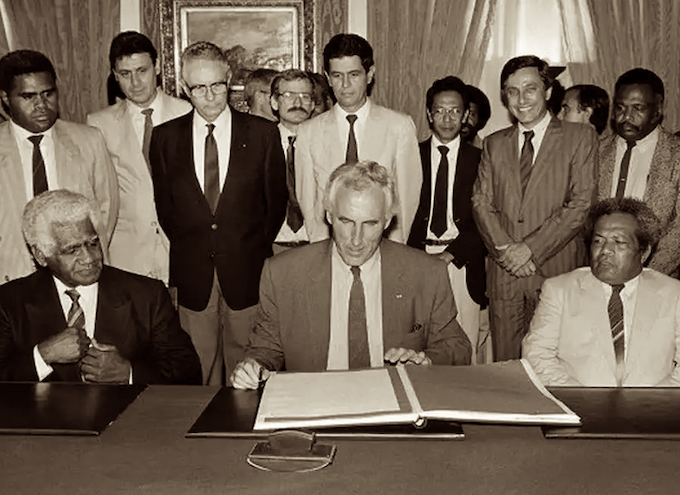
By Patrick Decloitre, RNZ Pacific French Pacific desk correspondent
One of the key players in the restoration of peace in New Caledonia in the 1980s, Louis Le Pensec, died last week aged 87.
Le Pensec is regarded as one of the main actors in the negotiations that led to the signing of the Matignon-Oudinot Accords in 1988 which put an end to half a decade of a bloody civil war in the French Pacific territory.
He was then French Minister for Overseas Territories and was specifically tasked by French Prime Minister Michel Rocard to bring pro-France and pro-independence politicians and militants to a truce and an eventual agreement.
The first of the two agreements, the Matignon Accord, was signed between pro-French leader Jacques Lafleur and the charismatic pro-independence figure Jean-Marie Tjibaou under the auspices of Socialist PM Rocard.
Le Pensec took care of the second pact, the Oudinot Accord, signed a few weeks later in August 1988.
The set of agreements mostly enacted the return of civil peace in New Caledonia, but also paved the way for a possible self-determination future for New Caledonia.
Return to civil peace
Ten years later, in 1998, the Nouméa Accord paved the way for a series of pro-autonomy measures, including the creation of three provinces and their assemblies, a Congress and a local “collegial” government.
It also prescribed a series of three referendums on New Caledonia’s self-determination, which have now taken place between 2017 and 2021.
Tributes flowing from all sides
The announcement of Le Pensec’s passing was followed by emotional reactions in New Caledonia.
New Caledonia’s local government paid homage to the former minister, and the “essential role” he played in the 1980s negotiations to restore peace.
“He laid the foundation stones for a lasting peace and a pacific coexistence between our different communities,” a statement said.
“He contributed to the search for consensual solutions in order to lay the foundations of a constructive dialogue . . . He opened the way to a period of social and political stability, thus allowing New Caledonia to progress serenely towards its destiny.
“May we keep following this peaceful and brotherly path that he has left us,” New Caledonia’s government concluded.
The local government also recalled Le Pensec explaining the context of the negotiations in the 1980s and how he was given the New Caledonian mission by French PM Rocard.
“He told me: ‘Louis, now for you it’s [New] Caledonia’. I was shocked because I knew how big a challenge that was.
And then (Rocard) told me: ‘You’ll see, a Breton [person from Brittany region, Western France] like you will get along fine with the Kanaks . . . Later, I realised how true that was, how that Kanaks customs were in many ways similar to the customs of my Brittany,” he confided in 2018.
“During our meetings, we never went straight to the point, first we would talk for about two hours about non-essential things, like the weather . . . and also there was this thing we had in common, the feeling of belonging to what you can call minority people”.
“So all this facilitated a mutual confidence, I do realise how lucky I have been to live that and above all to see that sometimes political talk can silence weapons”.
Le Pensec was France’s Minister for Overseas Territories between 1988 and 1993.
Some of the reactions coming from Paris included French Defence Minister Sébastien Lecornu, who recently held the Overseas portfolio.
“Through his participation to the building of the Matignon-Oudinot Accords, [Le Pensec] allowed the opening of a path of hope and peace for New Caledonia,” he messaged on X, formerly known as Twitter.
Pro-independence politician and current chair of New Caledonia’s Congress, Roch Wamytan, paid tribute to Le Pensec’s “humanity” and capacity to listen and foster fructuous dialogue, “as opposed to his present colleagues”.
Pro-independence demonstration in the streets of Nouméa
Coinciding with the ex-minister’s death announcement, in Nouméa, on Thursday, one of the components of the pro-independence umbrella FLNKS, the Union Calédonienne (UC), was demonstrating in front of the Congress to voice its opposition to what they described as the French government’s “forceful” manners in its plans to change New Caledonia’s electoral roll eligibility with a constitutional amendment.
The plan, announced after Christmas, is scheduled to set a vote in the French Congress (a special gathering of France’s two Houses, the National Assembly and the Senate) during the first quarter of 2024.
Brandishing banners denouncing the “people’s colonisation” on Thursday, protesting participants included UC members and sympathisers, but also close entities such as the USTKE trade union, as well as a UC-revived, self-styled “field action coordination cell”.
Other components of the FLNKS, such as the Kanak Liberation Party (PALIKA) and the Melanesian Progressist Union (UPM) are not taking part in those actions and have advised their members and supporters to refrain from doing so.
Since last year, the French government has been trying to bring back pro-France and pro-independence politicians to the table so that they can reflect and envisage a new agreement for New Caledonia’ s political and institutional future.
After more than 25 years of existence, the Nouméa Accord is deemed to have expired, but is now waiting for a new document to replace it.
Just before her resignation, a few days ago, then Prime minister Elisabeth Borne had given New Caledonia’s political players until 1 July 2024 to agree on a new consensus for New Caledonia.
She also announced France’s plan to “unfreeze” New Caledonia’s electoral roll (which was “frozen” under temporary restrictions for the implementation of the Nouméa Accord) so that French citizens who have resided in the territory for more than 10 years are eligible to vote for local elections.
This article is republished under a community partnership agreement with RNZ.











































